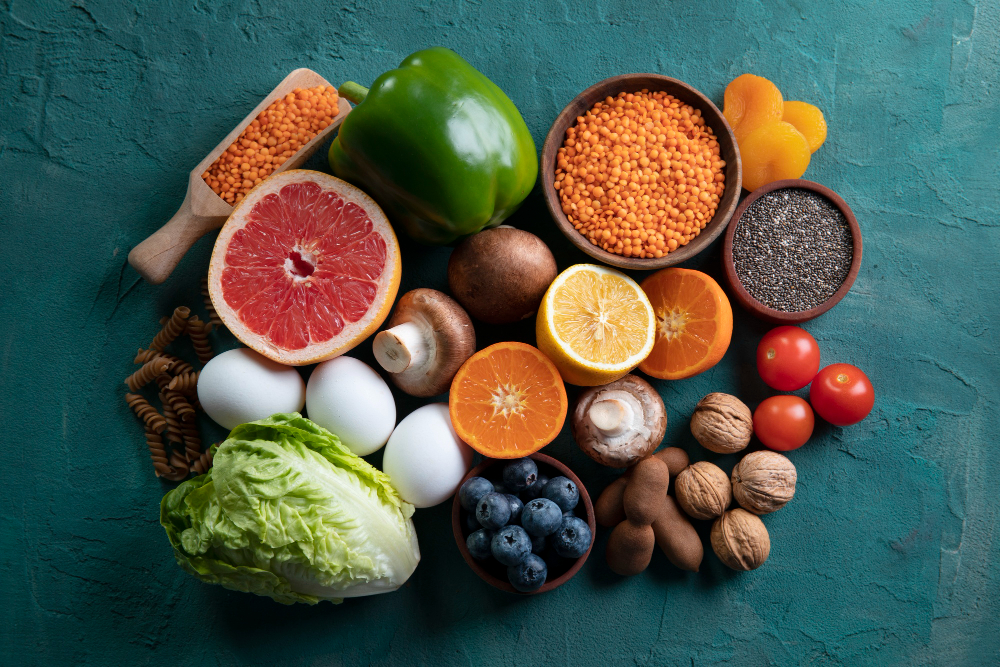Melanin-Rich Foods for Hair: Your Natural Path to Black, Vibrant Hair
Have you ever stood in front of a mirror, brushing your hair, only to notice a few stubborn grey strands peeking through? Whether you’re in your late 30s or early 20s, premature greying has become a growing concern. But what if the solution goes beyond dyes and serums, and starts with the food you eat every day? The color of our hair is determined by melanin, a pigment produced in the body. Melanin also protects your strands from sun damage and environmental stressors. As melanin levels decline, hair becomes grey, brittle, and less resilient. And just like our skin and overall health, what we eat can have a powerful impact on melanin production. Including melanin-rich foods for hair in your daily diet could be one of the perfect solutions that you have been looking for.
Read further to learn the science and nutrition behind melanin, why it matters, and how you can naturally boost it through food.
What is Melanin and Why Is It Essential for Hair?
Melanin is a natural pigment produced by specialized cells called melanocytes. It determines the color of your hair, skin, and eyes. In hair, melanocytes are found in hair follicles, and they inject melanin into each strand as it grows.
But melanin does more than color hair. It acts as a protective agent by:
● Shielding hair from harmful UV rays
● Reducing oxidative stress
● Improving hair resilience and shine
● Preventing dryness and split ends
When melanin levels drop, your hair loses its pigment, turning grey or white. In addition, it becomes more vulnerable to damage, leading to weaker, duller strands.
The Different Types of Melanin in Hair
To understand how melanin impacts hair color, it’s helpful to know its types:
● Eumelanin: Responsible for brown and black hair tones. The more eumelanin you have, the darker your hair.
● Pheomelanin: Gives hair red, orange, or yellowish hues.
● Mixed Melanin: A combination of eumelanin and pheomelanin, resulting in shades like light brown or auburn.
As we age or encounter stress and nutritional deficiencies, the production of these pigments begins to decline, often leading to grey or white hair. Understanding these types is essential because your ability to retain or increase melanin depends on which type your body is naturally predisposed to produce.
What Causes Hair to Turn Grey or White Prematurely?
The timing of greying hair varies from person to person. While genetics does play a big role, other external and internal factors influence melanin production:
Nutritional Deficiencies
Vitamin B12: Crucial for melanin production. A deficiency can lead to early greying.
Copper: Helps in melanin synthesis by activating tyrosinase (an enzyme essential for melanin).
Iron & Folate: Support cell growth and melanin-forming processes.
Stress
Chronic stress can impact the body’s ability to regenerate melanocytes, accelerating greying.
Smoking and Pollution
Toxins from cigarette smoke and environmental exposure can damage hair follicles.
Hormonal Imbalances
Conditions like hypothyroidism or autoimmune diseases may reduce melanin levels.
Aging
Over time, melanocyte cells gradually slow down, which is a normal part of aging.
Chemical Treatments
Frequent bleaching, dyeing, and heating tools can weaken hair and reduce its pigment-retaining ability.
While some of these causes may be unavoidable, many are within our control. And this is where food becomes your first line of defense.
Which Food Increase Melanin in Hair? Discover the Top Choices
The body’s ability to produce melanin is closely tied to the availability of specific vitamins, minerals, and amino acids. Here are the most effective melanin rich foods for hair you should incorporate into your meals:
1. Spinach
Packed with iron, folate, magnesium, and vitamins A, C, and E, spinach helps in maintaining the oxygen supply to hair follicles and boosts melanin production. Its antioxidant properties also combat oxidative damage that accelerates greying.
2. Eggs
Eggs are loaded with biotin, selenium, and a key amino acid called tyrosine, which is directly involved in melanin synthesis. Regular consumption of eggs strengthens hair and supports its natural pigment.
3. Blueberries
One of the richest sources of antioxidants and vitamin C, blueberries help protect melanocyte cells from free radical damage, allowing them to keep producing melanin efficiently.
4. Avocados
Avocados provide healthy fats, vitamin E, and B6, all essential in supporting cellular health and melanin production. They also help nourish the scalp and improve hair texture.
5. Carrots
Known for its high beta-carotene content, carrots convert vitamin A in the body, a crucial vitamin for the health of melanin-producing cells.
6. Walnuts
Rich in copper and omega-3 fatty acids, walnuts support the enzyme tyrosinase, which is essential for melanin synthesis. They also enhance scalp circulation.
7. Salmon
A great source of vitamin B12 and selenium, salmon supports melanin retention and improves overall hair strength.
8. Dark Chocolate
High in copper, flavonoids, and iron, dark chocolate enhances blood circulation in the scalp and boosts melanin levels over time.
9. Liver
Organ meats like liver are nutrient powerhouses, rich in vitamin A, iron, and copper, an ideal combination for revitalizing hair pigmentation naturally.
10. Sweet Potatoes
The vitamin A and B6 content supports scalp health, melanin production, and the metabolism of tyrosine, the building block of melanin.
11. Tomatoes
Provide lycopene and vitamin A, which support hair texture and pigmentation.
How to Increase Melanin in Hair: Meal Plan Tips
Knowing what to eat is just half the journey; the key is incorporating these foods consistently.
Morning Meal
● Scrambled eggs with sautéed spinach and tomatoes
● A glass of orange juice (for vitamin C)
Mid-Morning Snack
● A handful of walnuts and blueberries
Lunch
● Grilled salmon salad with avocado, carrots, and olive oil dressing
● A sweet potato mash on the side
Evening Snack
● A smoothie with spinach, banana, almond milk, and a square of dark chocolate
Dinner
● Stir-fried liver with roasted broccoli
● Baked sweet potatoes
● Green tea before bed
This diet plan combines antioxidant-rich ingredients with essential vitamins and minerals to nourish your hair from within.
Benefits of Melanin-Rich Foods for Hair
When you fuel your body with the right nutrients, the results show not just in your hair color but also in its strength, shine, and texture. Here’s what you can expect over time:
● Delayed Greying: A consistent intake of melanin-supporting foods slows down the premature loss of hair color.
● Improved Hair Texture: Stronger hair shafts mean less breakage and dryness.
● UV Protection: Naturally pigmented hair offers better protection from sun damage.
● Thicker, Healthier Hair: Nutrients improve follicle strength and growth rate.
● Scalp Health: Better circulation and nourishment help reduce dandruff and flakiness.
Incorporating melanin rich foods for hair into your regular diet is a long-term investment in natural beauty and wellness.
Cost-Effective and Accessible: No Fancy Superfoods Needed
You don’t need expensive supplements or exotic ingredients to support melanin production. Most of the foods listed above are common, budget-friendly, and available year-round.
● Affordable Choices: Eggs, spinach, carrots, sweet potatoes, tomatoes
● Moderately Priced: Walnuts, blueberries, avocados
● Occasional Splurges: Salmon, liver, dark chocolate
With smart planning, even a modest grocery budget can support your journey to naturally black hair.
Natural vs Artificial: Why Food-Based Approaches Win
While hair dyes may offer quick cosmetic solutions, they do little to address the root cause of greying. In contrast, melanin-rich foods work from the inside out, nourishing your scalp, supporting melanocytes, and promoting long-term hair health.
Moreover, these foods help with pigmentation and improve your overall well-being. From better skin to enhanced brain function, the benefits are holistic.
Common Myths About Grey Hair and Melanin
Myth 1: Greying is purely genetic.
Truth: Genetics play a role, but lifestyle and diet can influence the timing and extent.
Myth 2: Once grey, hair can’t regain its color.
Truth: While challenging, some people report regaining pigment through nutrient therapy and stress reduction.
Myth 3: Only supplements can help.
Truth: Whole foods are safer, more effective, and come with added health benefits.
Your Action Plan for Healthier Hair
Assess your diet – You need to assess if you are eating enough foods high in B12, copper, and antioxidants.
Build a weekly meal plan – Include 5 to 7 different melanin-rich foods.
Minimize stress – High stress reduces stem cells that support melanin production. Practice yoga, deep breathing, or journaling.
Avoid harsh hair treatments – Opt for mild, natural shampoos and conditioners. Avoid frequent bleaching or dyeing.
Get enough sleep – Your body, including your hair, repairs and regenerates while you sleep. Aim for 7 to 8 hours.
Avoid Smoking – Cigarette toxins directly damage melanocytes and accelerate greying.
Small, consistent changes in your daily habits can add up to big results over time.
The key lies in consistent self-care: feeding your body with melanin-rich foods, protecting it from damage, and managing stress. Over time, you’ll notice more than just darker hair, you’ll feel stronger, more confident, and energized.
Why Choose Labelle for Your Hair Pigmentation Journey?
When you’ve done your part from the inside, let the experts help from the outside. At Labelle, we believe true beauty begins with care. Whether you’re struggling with premature greying, hair fall, or just want to rejuvenate your locks, Labelle provides personalized hair fall treatment & solutions backed by science and trusted by thousands.
Ready to bring out the best in your hair? Trust Labelle. Book your consultation today.
FAQs:
What are melanin rich foods for hair?
Melanin-rich foods for hair include nutrient-dense options like spinach, eggs, salmon, avocados, carrots, dark chocolate, and walnuts. These foods contain vitamins, minerals, and antioxidants that support melanin production and improve hair pigmentation naturally.
How to increase melanin in hair through diet?
You can increase melanin in hair by consuming foods high in copper, vitamin B12, vitamin A, and tyrosine. These are nutrients crucial for melanin synthesis. Incorporate leafy greens, seafood, eggs, and legumes into your daily meals for best results.
Which food increases melanin in hair most effectively?
Foods like eggs (rich in tyrosine), dark chocolate (high in copper), and spinach (loaded with antioxidants and vitamin E) are among the best choices for boosting melanin levels naturally.
Can eating melanin-rich foods reverse grey hair?
While melanin-rich foods can slow down or prevent further greying caused by nutritional deficiencies or oxidative stress, they may not reverse greying due to genetic factors. However, they do support overall hair health and pigmentation.
Is vitamin B12 important for melanin production?
Yes, vitamin B12 plays a critical role in oxygen delivery to hair follicles and melanin-producing cells. A deficiency in B12 is one of the known causes of premature greying.
How long does it take for melanin-rich foods to show results in hair pigmentation?
Visible changes in hair health and pigmentation may take a few weeks to a couple of months, depending on the severity of melanin depletion, your diet consistency, and overall health condition.
Are supplements necessary to boost melanin levels in hair?
Supplements can be helpful if you have a diagnosed deficiency (like B12 or copper), but most people can get sufficient nutrients through a well-balanced, melanin-boosting diet. Consult a healthcare provider before starting supplements.
Do melanin-rich foods help with hair loss?
Yes, many melanin-rich foods also promote hair growth by strengthening follicles and reducing oxidative damage. Nutrients like biotin, protein, and omega-3 fatty acids are essential for both pigmentation and thickness.
Can stress reduce melanin in hair?
Chronic stress can impact stem cell activity that supports melanin production, potentially leading to premature greying. A balanced diet combined with stress management is key to maintaining hair color.
Why is professional help like Labelle recommended for greying hair?
While dietary changes support melanin levels, professional treatments can target underlying scalp conditions, hormonal imbalances, or genetic issues more effectively. Labelle provides expert therapies tailored to individual hair concerns for optimal results.
Image Designed by Freepik

